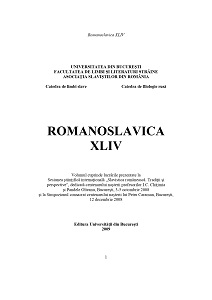Tadeusz Borowski şi Alsous Huxley despre universul concentraţionar
T. Borowski and A. Huxley. The Nazi Labor Camp System
Author(s): Cristina-Liana IvanSubject(s): Novel, Short Story, Comparative Study of Literature, Polish Literature, Fascism, Nazism and WW II, Theory of Literature, British Literature, Sociology of Literature
Published by: Editura Universităţii din Bucureşti
Keywords: T. Borowski; A. Huxley; Nazi Labor Camp System;
Summary/Abstract: Tadeusz Borowski succeeds in impressing his readers by the overflowing honesty of his writing style, by an amazingly simple and franc attitude towards the world, an attitude which he prefers rather than writing about a dramatic eulogy of labor camp’s victims. The comparison with Aldous Huxley seems to be pertinent only in an imagistic way. While one of them objectively described the horrors of Nazism, from his own life experience, the other one, being pressed and influenced by the 20st Century social changes, is figuring out a despotic world, dominated by absolute totalitarianism, where people were educated during their sleep and were easily determined to accept the following slogan: “changing is better than mending”. Facing Borowski’s short stories with Huxley’s novel A Brave New World, one might prove that no SF can keep for too long his imaginary status, since it is built out of the crude reality. Eventually, it becomes the reality itself. The Fascist regime was extremely closed to set out such a brand new society, where it would have exist only the small group of leaders (Subjects) and the huge mass of tools (The Hands).
Journal: Romanoslavica
- Issue Year: XLIV/2009
- Issue No: 1
- Page Range: 125-132
- Page Count: 8
- Language: Romanian

